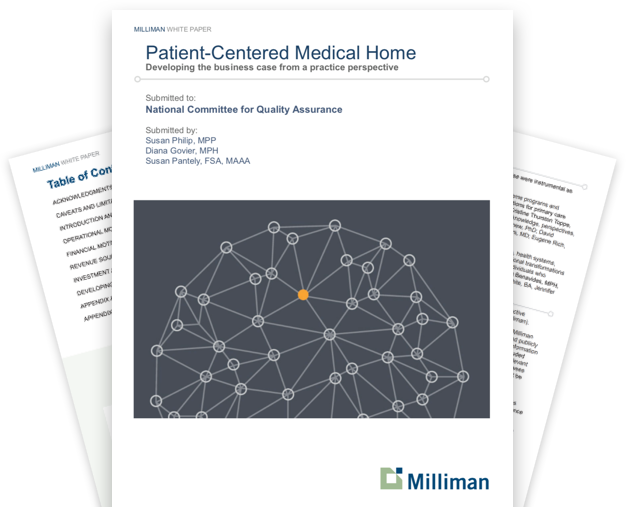Patient-Centered Medical Home (PCMH)
NCQA’s Patient-Centered Medical Home (PCMH) Recognition program is the most widely adopted PCMH evaluation program in the country. More than 10,000 practices (with 50,000+ clinicians) are recognized by NCQA. More than 95 organizations support NCQA Recognition through providing financial incentives, transformation support, care management, learning collaboratives or MOC credit.

About PCMH
The patient-centered medical home is a model of care that puts patients at the forefront of care. PCMHs build better relationships between patients and their clinical care teams.
Research shows that PCMHs improve quality and the patient experience, and increase staff satisfaction—while reducing health care costs. Practices that earn recognition have made a commitment to continuous quality improvement and a patient-centered approach to care.
New Guidance: Modifications to Scoring for NCQA Recognition Program Evaluations
We know that many organizations are determining how recent executive orders regarding gender identity, diversity, equity and inclusion apply to their ongoing work, and are wondering how best to navigate their obligations to federal and state partners and to their members and patients.
As a federal contractor, NCQA is evaluating how the executive orders impact NCQA and our programs. We also know that many of our customers and quality partners are considering the impact of the executive orders. Our goal with this guidance is to clarify NCQA’s scoring during this rapidly evolving health policy environment. We are therefore implementing scoring modifications to certain criteria for evaluations starting on or after February 12, 2025, for the programs listed below.
- Patient-Centered Medical Home.
- Patient-Centered Specialty Practice.
- Virtual Primary and Urgent Care Accreditation.
Modifications to how NCQA scores evaluations can be viewed here.
This guidance will remain in effect until April 30, 2025, or until NCQA issues further guidance.
NCQA remains committed to driving health care quality improvement and giving patients and members access to high-quality, appropriate care that meets their unique needs.
Please submit questions via My NCQA.
Thank you for your continued partnership as we work together to improve health care quality for all.
- Save
Save your favorite pages and receive notifications whenever they’re updated.
You will be prompted to log in to your NCQA account.
Save your favorite pages and receive notifications whenever they’re updated.
You will be prompted to log in to your NCQA account.
- Email
Share this page with a friend or colleague by Email.
We do not share your information with third parties.
Share this page with a friend or colleague by Email.
We do not share your information with third parties.
- Print
Print this page.
Print this page.
Overview
Why PCMH?
-
Reduce Fragmentation
The PCMH model emphasizes team-based care, communication and coordination, which has been shown to lead to better care.
-
Align With Payers
Many payers acknowledge PCMH Recognition as a hallmark of high-quality care. As a result, many payers provide incentives for NCQA-Recognized practices.
-
Improve Staff Satisfaction
The PCMH model is associated with better staff satisfaction. One analysis found implementation of NCQA PCMH Recognition to increase staff work satisfaction while reported staff burnout decreased by more than 20%.1
-
Improve Patient Experience
A Hartford Foundation study found that the PCMH model resulted in a better experience for patients, with 83% of patients saying being treated in a PCMH improved health.1
-
Better Manage Chronic Conditions
The PCMH model has been shown to help better manage patients’ chronic conditions.
-
Align With State/Federal Initiatives
As more emphasis is placed on value-based care, many state and Federal programs are embracing the patient-centered model of care.
-
Lower Health Care Costs
PCMH Recognition is associated with lower overall health care costs.
-
Improve Patient-Centered Access
PCMHs emphasize the use of health information technology and after-hours access to improve overall access to care when and where patients need it.
Get Started with PCMH Recognition
Get Started with PCMH Recognition
Latest PCMH Blog Articles
Latest PCMH Videos
PCMH Distinction Programs
Distinction in Behavioral Health Integration
NCQA’s Distinction in Behavioral Health Integration recognizes primary care practices that put resources, protocols, tools and quality measures in place to support the broad needs of patients with behavioral health related conditions.
We’re ready to help
Contact us today
- Current Customer? Ask a Question
Using My NCQA
- Interested in PCMH? Contact Us Today!
We're Here To Help.

